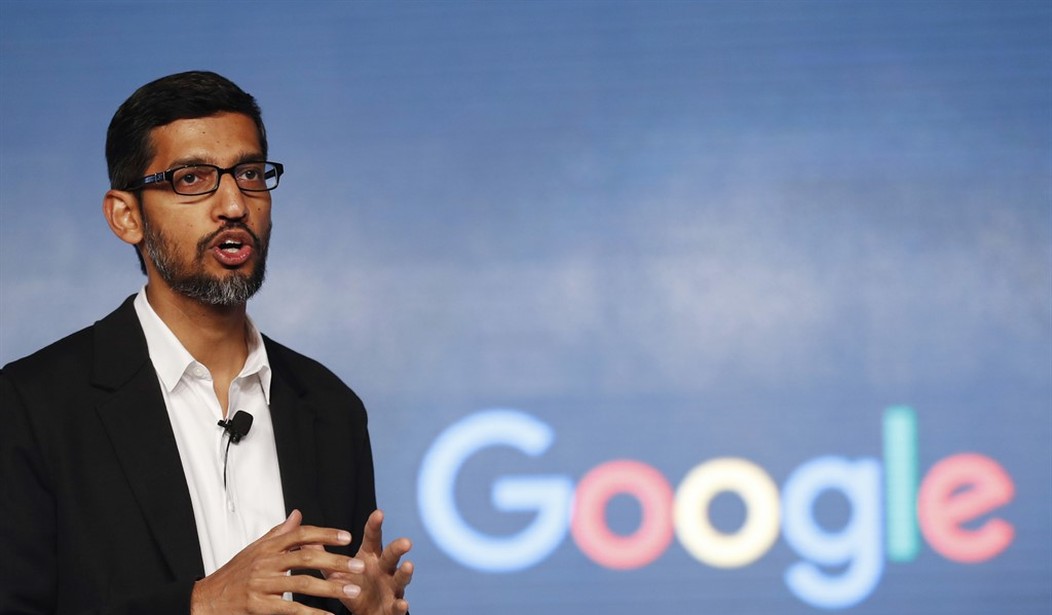Time for Google’s top man to hit the bricks, David Brooks declares at the New York Times, a signal that the fog of media bias may be burning off this scandal. Brooks fingers Google CEO Sundar Pichai as the worst-behaved figure in the controversy surrounding a memo on diversity issues written by an engineer at the communications giant, and excoriates him for caving to a lynch mob. If Pichai’s not prepared to be a leader, then it’s time for him to go, argues Brooks:
Which brings us to Pichai, the supposed grown-up in the room. He could have wrestled with the tension between population-level research and individual experience. He could have stood up for the free flow of information. Instead he joined the mob. He fired Damore and wrote, “To suggest a group of our colleagues have traits that make them less biologically suited to that work is offensive and not O.K.”
That is a blatantly dishonest characterization of the memo. Damore wrote nothing like that about his Google colleagues. Either Pichai is unprepared to understand the research (unlikely), is not capable of handling complex data flows (a bad trait in a C.E.O.) or was simply too afraid to stand up to a mob.
Regardless which weakness applies, this episode suggests he should seek a non-leadership position. We are at a moment when mobs on the left and the right ignore evidence and destroy scapegoats. That’s when we need good leaders most.
It might be time for him to go simply for cluelessness. After firing James Damore in part for pointing out that Google imposes an ideological bubble within the organization — which his firing amply proved — Pichai then decided to hold an “all hands” meeting to discuss diversity. What could go wrong? Practically everything:
Google CEO Sundar Pichai has canceled an all-hands meeting scheduled for Thursday afternoon to address the diversity controversy that has dogged company for the past week after some of the proposed questions were leaked online.
Pichai wrote that he looked forward to “a frank, open discussion” just days after firing someone who respectfully submitted frank and open thoughts on diversity:
We had hoped to have a frank, open discussion today as we always do to bring us together and move forward. But our Dory questions appeared externally this afternoon, and on some websites Googlers are now being named personally. Googlers are writing in, concerned about their safety and worried they may be “outed” publicly for asking a question in the Town Hall.
In recognition of Googlers’ concerns, we need to step back and create a better set of conditions for us to have the discussion. So in the coming days we will find several forums to gather and engage with Googlers, where people can feel comfortable to speak freely. We’ll share details soon.
Over the past two days, I have had the chance to meet with so many people here, and I have read each of your emails carefully. The vast majority of you are very supportive of our decision. A smaller percentage of you wish we would do more. And some are worried that you cannot speak out at work freely.
Gee, I wonder why they feel they can’t speak freely? Whether or not one agrees with the scientific claims in the memo regarding biological influences on career choice, which are largely non-sequiturs to company policy development, there was nothing hostile or demeaning about it. Even if it was wrong-headed, the proper response would have been to respond to it and to counsel the employee to focus his attention elsewhere.
It seems much more likely that Damore got fired for telling Google execs about the perceived consequences within the organization of opposing its ideological bent. They proved Damore right in firing him, and then trumping up his memo as something so far beyond the pale that Damore couldn’t possibly work there any longer. Pichai then wanted to hold a public meeting for a “frank, open discussion,” which under these circumstances would have almost certainly produced the kind of frank and open discussions that emperors used to get when they held court. Let me tell you all the reasons we think you’re aaaawwwwweeeeeeesooooooome.
Brooks does Damore a service here, and a service to truth as well, by using his platform at the Paper of Record to correct the record on his memo. Pichai has been using media mischaracterizations as a fig leaf to cover for his ideological retaliation against Damore. Brooks helps strip that fig leaf, and exposes Pichai as a naked ideologue. That alone doesn’t disqualify Pichai for a CEO role, but his rank dishonesty and lack of ethics should, especially in the communications industry.
Update: Take this for what it’s worth, but Pichai’s decision to fire Damore may not be as popular within his ranks as he’s declared:
Blind, an anonymous corporate networking app, surveyed its users from over 4,000 different companies on their thoughts regarding Google’s firing of software engineer James Damore, according to Business Insider. At Google, 56 percent of the 441 employees surveyed opposed their company’s decision to fire Damore.
Blind also reported employee opinions across other tech companies, which seem to support the fired software engineer.
A majority of Microsoft, Facebook, and Amazon employees surveyed also opposed Google’s decision by margins of 57-43, 56-44, and 54-46, respectively. Nearly two-thirds of Uber’s employees surveyed also opposed the choice to terminate Damore.
What do you think the odds were that 56% of the feedback during the “frank, open discussion” would have been critical of that decision? Or even 5.6% of the feedback?








Join the conversation as a VIP Member